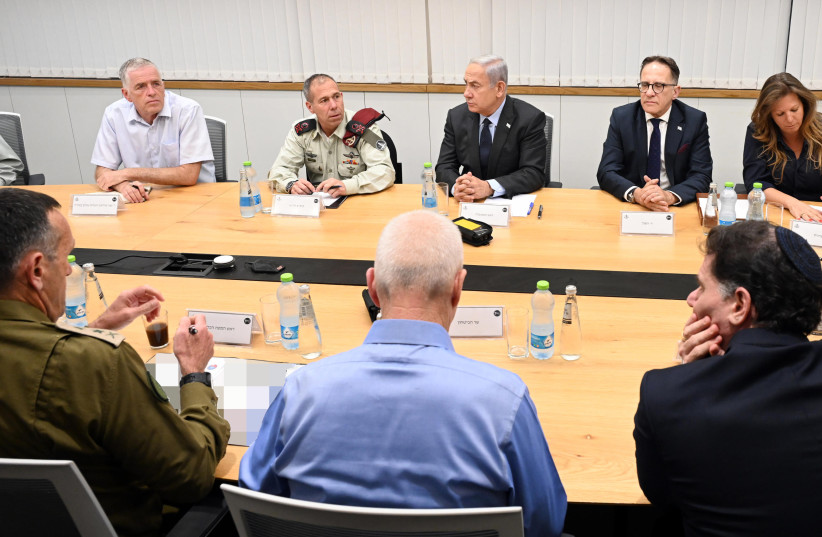Nobody is infallible; nobody is above criticism: not presidents, prime ministers, Supreme Court justices, chief rabbis, or heads of the IDF, Mossad, or Israel Security Agency (Shin Bet).
Yet there is a way to criticize and a way not to criticize.
Over the past week, coalition MKs have illustrated on two separate occasions how not to criticize.
On Sunday, Yediot Aharonot reported that Shin Bet head Ronen Bar warned Prime Minister Benjamin Netanyahu that Jewish acts of terror are inflaming Palestinian terror and widening the circle of Palestinians engaged in terrorism.
According to the report, Bar’s warning preceded Friday night’s incident in Kfar Burka, where a Palestinian man was killed during a violent conflict with Israelis. Two of the Israelis involved, including Otzma Yehudit MK Limor Son Har-Melech’s spokesman Eliezer Yered who was badly wounded by a rock thrown at his head, were arrested in the incident.

Ad hominem attacks
The Yediot report infuriated Son Har-Melech, who told Ynet regarding Bar’s warning that “they got mixed up and didn’t know how to define who the enemy is, and didn’t know how to deter or subdue the enemy, so we find ourselves facing such distorted definitions – who should you worry about and who should you fight?”
She charged that there was a “glass ceiling” in the army and the security establishment, and that “only people with very specific opinions are promoted, and those who think otherwise are not promoted.”
Likud MK Tally Gotliv chimed in, saying that “the ideas of the Left have also reached the top of the Shin Bet. The depth of the ‘Deep State’ has reached the head of the Shin Bet and the heads of the IDF. The timing of the announcement by the head of the Shin Bet is outrageous.”
This was the second time within a week that some on the Right slammed senior security officials. Following Tuesday’s terrorist attack in Ma’ale Adumim, Likud MK Avichay Buaron accused OC Central Command Maj.-Gen. Yehuda Fuchs of being more concerned about Palestinian freedom of movement than Israeli lives.
He said in an interview that “allowing movement for Palestinians is more important than hermetically protecting Israelis.”
Son Har-Melech echoed Buaron’s criticism and extended it to Defense Minister Yoav Gallant, who came to Fuchs’s defense.
“The time has come for a defense minister that cares for the right,” she said. “[Gallant] knowingly endangers the lives of Judea and Samaria residents. I would prefer a different defense minister who will care for the settlers.”
One of the problems with this type of criticism is that it attributes the absolute worst motives to the target of the complaint.
Does Son Har-Melech really think that the head of the Shin Bet, an organization whose operatives risk life and limb protecting Israeli citizens day and night, doesn’t know “who the enemy is”?
The same can be said of Gotliv’s diatribe. Does she really feel that some shadowy conspiracy – Deep State – has taken over the security services to the detriment of the country’s citizens, the same security services that on Sunday killed three terrorists in Jenin on their way to attack Israelis?
The same is true of the criticism of Fuchs. To say that the IDF could do more to protect Jews on the roads in Judea and Samaria is one thing, but to somehow imply that Fuchs doesn’t care about the safety of the settlers is something else altogether and crosses the line of legitimate criticism.
In a democracy, it is perfectly legitimate and absolutely necessary to scrutinize and question the actions of institutions like the IDF and Shin Bet, and both do get a fair share of criticisms from both the Right and the Left. Yet when that criticism descends into ad hominem attacks, focusing on the character and integrity of Bar, Fuchs, and even Gallant, then the criticism risks delegitimizing itself.
Real issues are at stake here: Are the IDF and the Shin Bet doing enough to protect Jews living beyond the Green Line? Are they doing enough to prevent acts of Jewish terror?
But shifting attention to personal attacks – accusing Bar of somehow not knowing who the enemy is or being part of a deep state conspiracy – simply prevents any meaningful and productive discussion about the real issues and undermines the chance of having any rational debate.
Rather than triggering a meaningful debate about the real issue at hand, this kind of ad hominem criticism leads to a futile dance about who has or has not condemned the criticism and whether it has been strong enough.
The issue, for example, ceases being whether the IDF or Shin Bet actions or policies are correct, but rather whether Netanyahu or other government ministers have condemned the critics of those policies in strong enough terms.
This type of criticism also adds to the hostile and polarized atmosphere that has already enveloped the country. Corrosive discussions focused on personal attacks rather than on the issues at hand only exacerbate divisions and make it more difficult to find any common ground.
These types of attacks also diminish the credibility of those making the claims – Son Har Melech and Gotliv should take note of how the public will view their comments in the future.
Even more damaging over the long term, however, is that ad hominem attacks allow the Shin Bet and IDF to dismiss the criticism because it is personal, something that undermines constructive criticism which is essential for continuous improvement.
